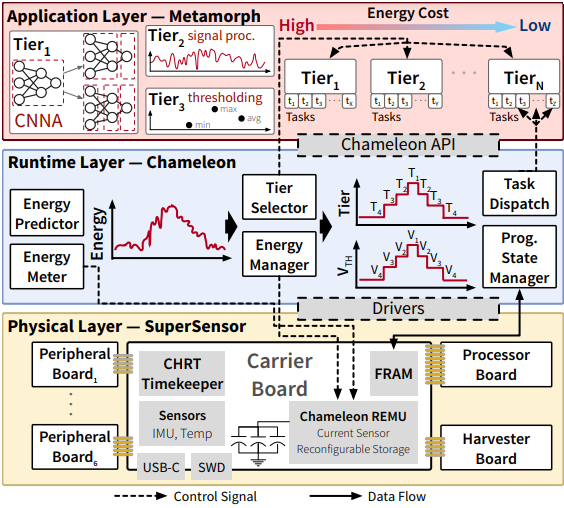
Protean, a multi-part framework for speeding up prototyping and deployment of robust, adaptive, and inference-driven battery-free, energy harvesting applications. Protean consists of three main sub-systems that encapsulate specific contributions.
- Supersensor, a modular plug-and-play hardware design that supports multiple harvesters, sensors, and MCUs with the help of novel interconnects. It consists of an energy measurement unit and an adaptive reconfigurable energy storage unit that powers a carrier board, a processor module, and up to six peripheral modules. In this paper, we limited our efforts to one processor module based on an ARM Cortex MCU with a hardware accelerator, two harvester modules, and five peripheral modules consisting of six sensors and two communication modalities. Everything combined allows for rapid prototyping from very simple to deep-inference applications.
- Chameleon, an adaptive task-based runtime that maintains forward progress and memory consistency despite intermittent power. It dynamically switches between different performance tiers of an application (that may map across multiple computational elements, i.e., accelerator, MCU) based on predicted energy. Chameleon is the first general, adaptive runtime system for ARM-based MCUs that makes the best use of available energy by dynamically switching between multiple tiers of computation for a single application.
- Metamorph, a code generating tool that takes user input, and standard CNN (TinyML) models and outputs an intermittencesafe task-based implementation. It allows for quick experimentation of different configurations of computing elements, including accelerator and MCUs.
Authors
Georgia Institute of Technology
Northwestern University
Delft University of Technology
Worcester Polytechnic Institute
University of Trento
Acknowledgements
We would like to thank Brian Rush and the MAX78000 team at Analog Devices for pointers on working with the accelerator chip and SDK, we thank Tommy Cohen for assistance with all graphics. This research is based upon work supported by the National Science Foundation (NSF) under award numbers, CNS-2145584, CNS-2038853, and CNS-2030251. It was also supported by the Netherlands Organisation for Scientific Research (NWO), and partly funded by the Dutch Ministry of Economic Affairs (EZK), through TTW Perspective program ZERO (P15-06) within Project P1. Any opinions, findings, conclusions, or recommendations expressed in this material are those of the authors and do not necessarily reflect the views of the NSF, NWO, or EZK.

